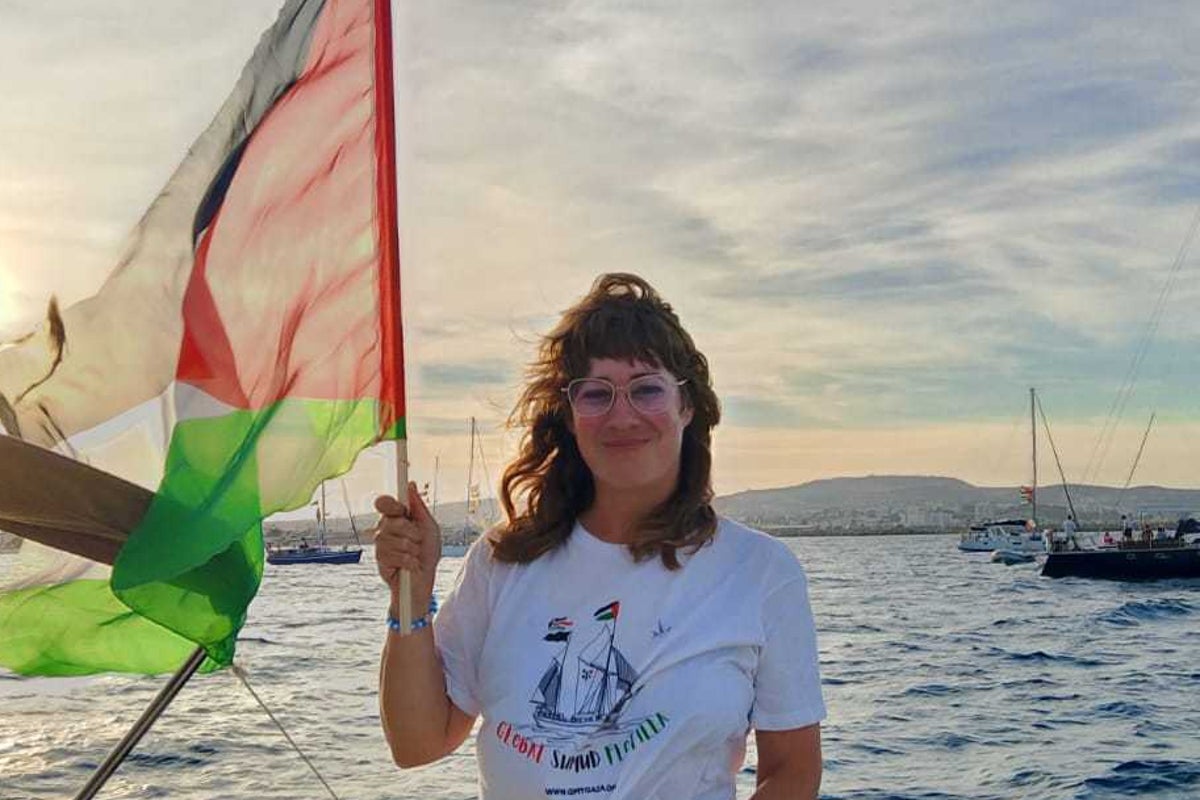A woman onboard the Gaza aid flotilla has said activists have to “accept they might die” as their ship nears the coast of the war-torn territory.
Ewa Jasiewicz is aboard one of 44 boats in the Global Sumud Flotilla, which is delivering aid to the war-torn territory. She is sailing the treacherous journey 15 years after witnessing Israeli forces kill nine of her fellow activists during a raid on the Gaza Freedom Flotilla in 2010.
After entering the ‘high-risk zone’ on Tuesday night, activists said the flotilla was “aggressively circled” by an Israeli warship which “steered dangerously close” to the vessels. The IDF has not commented on the incident.
“You just have to accept that you might die,” Ms Jasiewicz, a dual British-Polish national, told The Independent. “Everyone on the flotilla is fully informed, fully aware of the risks that they’re taking. But it’s worth it. I think solidarity and prevention of genocide, and the freedom of the Palestinian people, and collective liberation, demands this kind of action.”
Around 500 people from more than 40 countries – including Swedish activist Greta Thunberg – are onboard the fleet, which is expected to come into contact with Israeli forces in the coming days.
Israeli authorities have characterised the Global Sumud Flotilla as a publicity stunt, with the Foreign Ministry describing it as a “jihadist initiative serving the terror group’s [Hamas] agenda”. Activists have rejected these claims.
The aid ship has been escorted by navy ships from Spain and Italy during its journey and was at one point being circled by drones from Turkey as it approached Gaza – although Italian prime minister Giorgia Meloni has since called on the flotilla to “stop now”.
One of the flotilla’s aims is to deliver aid to Palestinians in Gaza, where famine has gripped areas of the strip following repeated Israeli blockades which have drawn international condemnation.
Israel says the blockades have been necessary in order to prevent Hamas seizing aid and argues that they are legal under international law. It has previously said it will use any means necessary to prevent the flotilla from reaching Gaza’s coast.
Ms Jasiewicz said that being killed is what the activists onboard the ship fear the most. “Being severely injured, having life changing injuries, that would be really bad.”
Last week, the Global Sumud Flotilla said several of its boats were targeted by Israeli drones while near the Greek island of Crete. Activists claimed to have heard 13 explosions and the sound of up to 16 drones. Their vessels were also allegedly sprayed with unidentified chemicals, sound bombs and explosive flares while their communications were jammed.
Israel did not respond to the allegations.
Confrontation with Israeli forces, for Ms Jasiewicz, is not a new experience. “I’ve witnessed loads of violence from the IDF [Israeli military] before, so I’m not too worried about PTSD, because I’ve already got it. Really, how much worse it can get?”
In 2010, she was part of a fleet of six civilian ships which Israeli troops raided in deadly scenes on 31 May, with nine activists killed, 30 injured and 10 Israeli troops wounded. Ms Jasiewicz heard the Israeli gunfire which her colleagues on a different vessel, with a tenth later dying of his injuries in hospital.
The exact sequence of events was heavily disputed afterwards. The Israeli military said it had been attacked by armed activists, before the Israeli Supreme Court found that the actions of the Navy in the raid was legal under international law.
Ms Jasiewicz said her boat, the Sumud, was confronted by “baclava wearing, gun-toting, hyped up commandos” who “took us over in a very violent way”. Activists were “attempting to repel [the navy] with throwing rubbish and hosing them”, she said, but this was “nothing can be seen as a risk to the life of heavily armed commandos”.
“They sprayed the boat and us with rubber bullets, and one of our team was hit in the face and was bleeding. They tasered an Australian journalist. They shouted at us, one of them said to me ‘shut the f*** up you f***ing b**** or I’ll kill you’.
“Two activists had bags put over their heads,” Ms Jasiewicz continued. “I had my arms tied behind my back. It was not a good experience, it was scary, being on a vessel that was moving.”
Once placed in prison, she alleged they were “treated in quite a humiliating way at all times, laughing at us, soldiers filming us on their phones”.
A report by the United Nations Human Rights Council (UNHCR) found that at least six of the deaths were “in a manner consistent with an extra-legal, arbitrary and summary execution”.
Despite their concerns about the future, Ms Jasiewicz said the mood on the Global Sumud Flotilla remains resilient. She is travelling on the All In vessel with six others from the UK, Algeria, France, Switzerland and Italy.
“We’re all determined. We’re all resolute. We are expecting an interception rather than an attack, because this is what we’ve been reading in the media. We’ve heard that the Israel wants to bring a prison ship to our flotilla and commandeer every boat, and then put us into this prison ship and then deport us.”
Meanwhile, in London, Camden Friends of Palestine has written to Sir Keir Starmer to demand that he guarantee the safety of Ms Jasiewicz – who is one of his constituents.
Ms Jasiewicz, one of several Britons onboard the flotilla, was scathing in her criticism of the prime minister.
“I’m not just baffled, I’m disgusted as well. So I fully expect my MP to intervene on my behalf and to support civilian efforts to break the siege on Gaza.”
The UK foreign office is in touch with the family members of British nationals on the Global Sumud Flotilla.
The Israeli military did not respond to a request for comment by The Independent.

